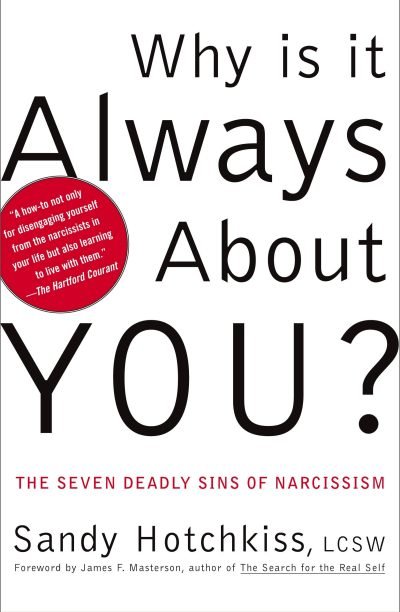articles
China Elevator Stories
“Why Is It Always About You?” (by Sandy Hotchkiss)
Sandy Hotchkiss explains the seven signs of a narcissist in her book.
29/12/2024

Ruth Silbermayr
Author

As a woman, I believe we all have a right to our own time and space, and to make decisions that work for us. But have you ever had to deal with selfish people who were so selfish that it severely impacted your life?
In my opinion, there is normal selfishness, and then there is extreme selfishness. Normal selfishness usually doesn’t affect others, but extreme selfishness does.
In Why Is It Always About You? : The Seven Deadly Sins of Narcissism, Sandy Hotchkiss explains how our world is full of selfish people who have no consideration for others and only think about how they can use them for their own purposes.
Living with someone who behaves like this, or even being in their vicinity, is no fun. This way of living is not normal, in my opinion, but Sandy Hotchkiss explains that it has become disturbingly normal.
When a person tries to ruin your relationships because you wouldn’t let a stranger partake in them, isolate you from people in your life, and live as though they were you, this points to extreme selfishness. Wanting what isn’t theirs, what they have no right to, and then punishing you for not giving it to them—without it being your fault—is a pattern I have experienced with an extremely deranged and mentally ill person. He is not only mentally ill but also one of the most arrogant and selfish people I’ve ever encountered. And I’ve met a lot of selfish people in my life! Of course, in his mind, and as he puts it, I am the one who is arrogant, egotistical, and selfish for not sharing my kids, my experiences with my kids, and all of my relationships with him.
How common extreme selfishness is has been shown to me repeatedly over the past few years while dealing with different people in different circumstances.
Sandy Hotchkiss explains that people have become less kind, corteous or generous. This is also what I have observed and experienced, not only while I was dealing with courts, but with society as a whole. I have also experienced it with regards to my former Chinese mother-in-law.
When a Chinese mother-in-law steals your children from you so she can parent them instead of you with no regard for you or you and your children’s feelings, this is extreme selfishness. It is selfish toward me, their mother, and selfish toward her grandchildren, who have the right to be parented by their mother, not their grandmother as the primary parent.
Selfishness and narcissism don’t only exist in the U.S.; they exist all around the world, including in Austria, China, and many other countries.
Sandra Hotchkiss, who wrote this book in 2003, explains that narcissism is not a new phenomenon.
In my opinion, the way narcissism manifests today has become very extreme. I can see a clear difference between how narcissists behaved in my parents’ generation, where most malignant narcissists still adhered to certain social rules and were, in general, more social and generous, and how they behave in mine. The difference is troubling, because narcissists in my parents’ generation, though sometimes extremely narcissistic, still had some regard for social boundaries and norms. Many narcissists in my generation seem to have lost that regard entirely. This is troubling for individuals, and for society as a whole.
Sandra Hotchkiss describes the seven sins of narcissism as ‘shamelessness’, ‘magical thinking’, ‘arrogance’, ‘envy’, ‘entitlement’, ‘exploitation’ and ‘lack of boundaries’. While some narcissists have their own boundaries, a lack of respect for the boundaries of others is a narcissistic trait I have experienced over and over.
If you can identify all of these seven traits in an individual, you may be dealing with a narcissist. Shamelessness, for example, means they take from others without feeling guilt; magical thinking means they believe the world revolves around them; arrogance makes them believe they deserve preferential treatment or that they have the right to put others down. Envy appears when they want what’s yours and will stop at nothing until they have it or destroy it. Entitlement shows when they believe they have rights they don’t, or when they demand that you sacrifice your valid needs for their invalid ones. Exploitation is too broad to explore here, and a lack of boundaries can be seen not only in their actions but also in their lack of respect for another person’s boundaries.
Have you ever met an extremely selfish person?